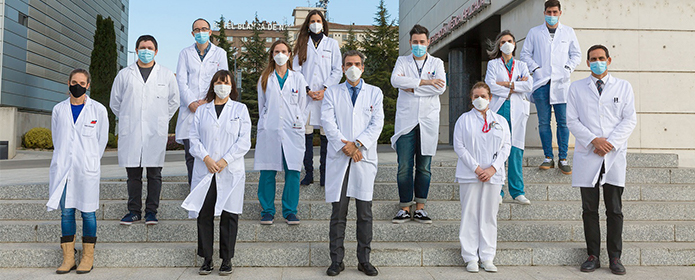New experimental immunotherapy strategy improves treatment of the most common form of lung cancer
Researchers at Cima and Clínica Universidad de Navarra demonstrate that combined blockade of Id1 and PD-1 enhances the immune and antitumor response in KRAS-mutated lung adenocarcinoma.

Researchers from the Cima and the Clínica Universidad de Navarra have identified in experimental mouse models a new immunotherapy strategy that improves the treatment of lung adenocarcinoma with mutations of the KRAS oncogene, subject the most common form of lung cancer and which, to date, lacks a targeted treatment that responds to its medical need. In this context, the researchers have demonstrated that the combined blockade of the Id1 gene and the PD-1 protein achieves a greater immune and antitumor response than conventional immunotherapy treatment against PD-1 in isolation. Thus, by means of this strategy they have managed to increase the survival of animal models by reducing the Issue of the disease at a localized level and also avoiding the generation of metastatic involvement.
knowledge The results of this research provide further insight into the behavior of this complex disease and could lead to new therapeutic alternatives. The research has been published in the latest issue of Cancersinternational scientific journal in Oncology.
Increased immune response and inflammation of tumor tissue.Lung adenocarcinoma accounts for more than 45% of lung cancers, according to the association Española Contra el Cáncer. Most of them (around 30%) are caused by mutations in the KRAS oncogene. Although advances in immunotherapy have improved clinical outcomes for patients with this disease, many of them do not benefit from currently available treatments. "The high Issue of cases, the complexity of the disease and the lack of effective targeted therapies make lung adenocarcinoma with KRAS mutations an unmet medical need that we wanted to try to address," says Dr. Ignacio Gil Bazo, researcher senior at Cima, co-director of the Clinic's department Medical Oncology and researcher lead author of the study.
Based on previous programs of study that demonstrated the immunosuppressive effect of the Id1 gene, this research explored the potential synergistic effect of Id1 inhibition and PD-1 blockade in animal models with KRAS-mutated lung cancer. "On the one hand, we observed that inhibiting the Id1 gene led to an increase in PD-L1 expression. This protein financial aid prevents immune cells from attacking tumor cells, and by increasing its expression, lung tumors become more sensitive to PD-1 inhibitors. On the other hand, by blocking PD-1, we are able to increase the infiltration of CD8+ T lymphocytes into both the tumor and the tumor microenvironment. The high toxicity of this subject of T lymphocytes (called cytotoxic) caused inflammation in the tumor tissue, enhancing its antitumor effect," explains researcher.
According to the researchers, this strategy has been shown to increase the survival of the animal models by reducing the Issue of the disease at a localized level and avoiding the generation of metastatic involvement. "Our next step is to validate these results in other models and to search for Id1 inhibitor molecules that are candidates for the design of drugs that can be transferred to the clinic," says Dr. Gil Bazo.
This work has constituted the main research of the doctoral thesis of Iosune Baraibar, oncologist who has made her specialization in the department of Oncology of the Clínica Universidad de Navarra, and has been partially funded by the department of Health, the Government of Navarra, the Merck Health Foundation and the Ministry of Science and Competitiveness through the Strategic Action in Health and the high school of research Carlos III. In turn, several of its researchers are part of IdiSNA and CIBERONC (research center Biomedical network in Cancer).
-
reference letter bibliography:
Cancers 2020. Baraibar, I. et al. Id1 and PD-1 Combined Blockade Impairs Tumor Growth and Survival of KRAS-mutant Lung Cancer by Stimulating PD-L1 Expression and Tumor Infiltrating CD8+ T Cells.
Doi: https://www.mdpi.com/2072-6694/12/11/3169#cite
